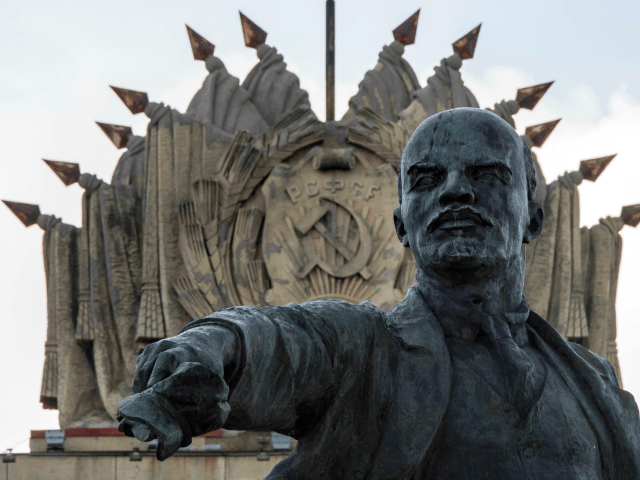Sky News allowed a Leftist filmmaker to declare the Bolshevik takeover of Russia a triumph for ‘ordinary people’ unchallenged for the centenary of the Red October coup d’état.
“After the Tsarist autocracy was dismantled, socialism was born under the lead of Vladimir Lenin,” says the Sky anchor in her introduction to the segment — an unusual way to describe the armed, moonlight takeover by the Communist leader’s Red Guards in October 1917, which displaced the provisional government installed by a genuine popular uprising in February.
Ceri Dingle, director of the crowdfunded film 1917: Why the Russian Revolution Matters, is then given free rein to assert that the Bolshevik coup “[E]ncouraged people to fight back against colonialism [and] helped women get equality and the right to vote”.
Dingle also claims that the Western reaction to the coup — “because Western elites at the time were so freaked” — ushered in “preventative measures that we don’t relate to the Russian Revolution, like the development of welfarism or state intervention in the economy, simply to prevent a repeat of what they saw as the lurid doings in Petrograd [St Petersburg].
“They didn’t want people in Britain and elsewhere to be inspired by people in Russia taking matters into their own hands.”
“So essentially, your take is that it was a good thing,” the Sky anchor replies, looking for a moment as though she might challenge these highly contentious claims — before simply inviting the filmmaker to detail what she sees as “misconceptions” about the coup, unquestioned.
“The film we’ve made is a myth-buster,” Dingle continues enthusiastically, claiming we’ve seen a “Disneyfication” of the takeover in recent years.
“So, for example, people see [the revolution] as a very bloody period in history. In fact, the storming of the Winter Palace, the October Revolution, was practically bloodless, [only] two people died,” she says.
“People think that history is one long evil continuum, from Lenin, to Stalin, to the Gulag, to the Holocaust, to Putin,” she adds, before asserting that this is “incredibly wrong”.
It is true that the takeover of the Winter Palace itself was achieved without much violence — although it was the Bolsheviks themselves who transformed it into a spectacular struggle in later years, staging exaggerated reenactments in order to boost its image relative to the earlier February Revolution, in which their role was relatively small.
The civil war and accompanying repression which followed the takeover, however, was far from bloodless, with the Reds battling the counter-revolutionary Whites across Eurasia, as well as the ordinary peasants who formed the Green armies in order to protect their communities from both sides. (The Greens were ultimately slaughtered by the Bolsheviks in their forest hideouts by extensive use of poison gas.)
The Sky anchor does not challenge Dingle on her account of Lenin’s “bloodless” takeover either, however, carrying on to ask her if it was “a product of ordinary Russians, or a conspiracy behind closed doors of the elite of that time”.
Dingle asserts confidently that the now commonly accepted view of the October Revolution as a Communist coup d’état is “another major myth”.
She derides any suggestion that it was “promulgated by Lenin and a few of his gang”, instead declaring it “a mass movement of ordinary citizens aspiring for peace, bread and land… the idea that it was a bunch of conspirators … is mythical.”
She adds that “the reason [the takeover] was bloodless was because it was so popular”.
This is a highly questionable assertion, given the long-awaited elections to the Constituent Assembly which followed in November — the first free elections in Russia’s long history — saw the Bolsheviks win just 24 per cent of the popular vote, with many fewer seats than the rival Socialist-Revolutionaries.
As a result, the assembly was dissolved more or less immediately, with the Bolsheviks declaring the Congress of Soviets [Workers’ Councils] — which they dominated — would be the country’s new governing body, precipitating years of desperate, trans-continental warfare.
To dismiss the idea that the Bolshevik takeover was any sort of conspiracy is also questionable, in light of the fact Germany helped shuttle Lenin into Russia in a sealed railway car following the February Revolution, in the (correct) belief that he would end Russia’s involvement in the First World War.
Dingle concluded by saying she thinks “we find [the Bolshevik coup] tricky here, [because] Britain welcomed the February Revolution and the toppling of the Tsar, but were horrified when people wanted to go further in the October Revolution.
“Churchill, for example, said ‘Kill the Bolshie, kiss the Hun’. Such was his horror, he’d rather have Germany on his side, warmongers, than ordinary people.”
It is quite true that Winston Churchill, who led the War Office in Liberal prime minister David Lloyd George’s government at the time of the Russian Revolution, was very much opposed to the Bolsheviks, and even deployed British forces to Russia to oppose them.
With the country fatigued by the First World War and few other members of the government able to see the warning signs which would in time lead to the horrors of the Gulag and forced collectivisation, however, Churchill soon lost support for this intervention, allowing the Communists to crush all opposition, consolidate their power, and ultimately invade neighbouring countries and foment more revolutions abroad.
Ms Dingle’s interviewer finishes the segment by thanking her uncritically for “sharing her analysis” and moves on to other matters.
Sky News: Director Ceri Dingle on the Russian Revolution
Director Ceri Dingle spoke to Sky News about the centenary of the Russian Revolution – why it matters, some of the big myths busted in the film and why it's wrong to see a resurgence in 'socialism' in politics today.Stream 1917: Why The Russian Revolution Matters here: https://vimeo.com/ondemand/127643/240809876Or buy the DVD here: https://www.amazon.co.uk/dp/B0772WCPSV
Posted by 1917: Why The Russian Revolution Matters on Friday, November 3, 2017

COMMENTS
Please let us know if you're having issues with commenting.